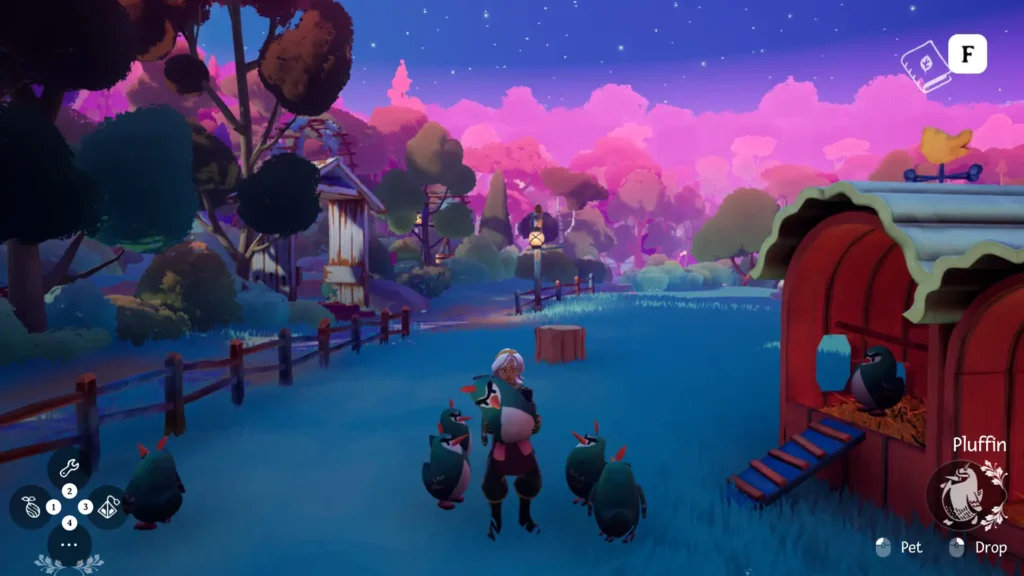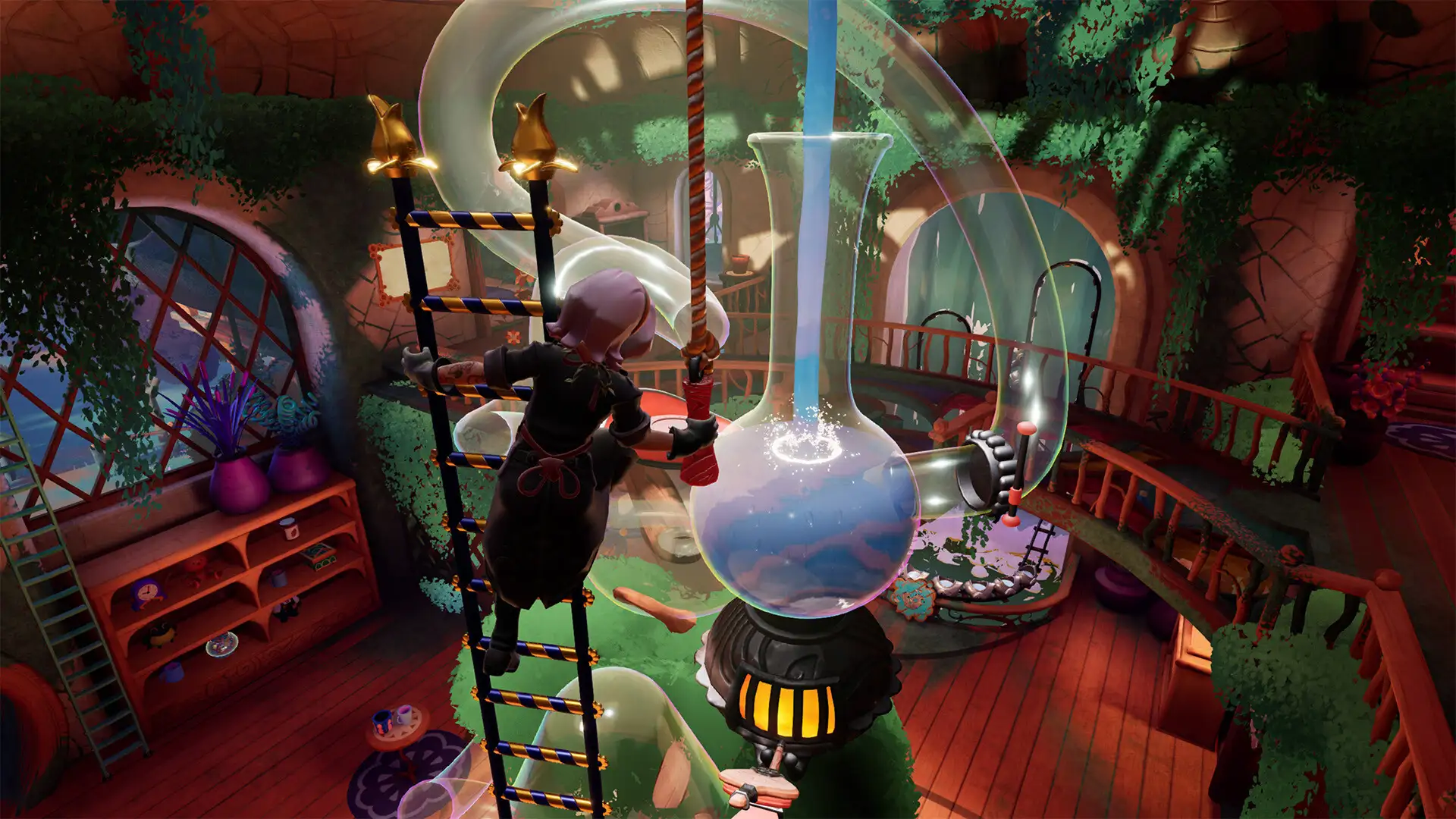Wanderstop presents itself as a gentle, cozy experience, yet it leaves a lasting emotional impact far deeper than expected. Created by the same developers known for deeply narrative-driven titles like The Stanley Parable and The Beginner’s Guide, expectations were set for a story rich with feeling, clever humor, and at least one reality-bending twist. All of those elements are indeed present—yet what makes Wanderstop unforgettable is how it confronts personal ideas about productivity and burnout, all under the guise of a serene tea-making simulator.
It’s worth noting up front: the less one knows about the narrative beforehand, the better the experience. Avoiding significant spoilers is key, especially since the main story twist appears quite early. At its heart, Wanderstop follows Alta, a battle-hardened fighter on a losing streak, as she seeks a cure for what she perceives to be a flaw within herself. Her journey leads her to collapse in a forest and awaken at Wanderstop, a peaceful tea shop run by the kind-hearted Boro. From here, Alta faces a simple yet profound choice: stay and rest, or force herself onward at any cost.
Exploring the Root of Burnout
Wanderstop doesn’t merely depict burnout—it interrogates the cycles that lead to it. The game paints a vivid picture of the compulsion to constantly move forward, driven not just by deadlines or goals but by an overwhelming desire to maintain control. It captures that all-too-familiar moment when the body gives out, demanding rest that feels more like guilt than relief. Though set in a fantastical world, the emotional experiences and internal struggles mirror real life with surprising clarity.
Wanderstop cleverly critiques modern ideas of rest, suggesting that even relaxation has been transformed into another form of productivity. At one point, Alta reflects that even taking a break can feel like yet another task to complete. This sentiment echoes through the experience, pushing players to recognize unsustainable habits. By journey’s end, Alta’s emotional growth mirrors the self-discovery players may find within themselves, making the story hit all the harder.

A Tea Shop with Emotional Depth
Though comparable in tone to emotional narratives like Spiritfarer, Wanderstop carves out its own identity. Visitors to the tea shop each bring a unique story, and building trust with them is essential before preparing their desired tea. Gathering ingredients from a small garden (or any space around the forest) becomes part of the puzzle, guided by a field journal that outlines specific seed patterns to produce rare plants. Each plant adds a new twist to tea flavors and effects, making gardening an engaging, methodical challenge.
Despite its intricate appearance, the tea brewing process is intuitive and satisfying. Climbing a rotating ladder, adjusting water temperatures, and combining ingredients through physical actions create a playful rhythm that becomes second nature. The tactile, almost theatrical steps of preparing tea give players a sense of mastery that complements the emotional arc of the narrative.
Conversations That Lead to Connection
The joy of Wanderstop also lies in interpreting the sometimes vague, often charming tea requests from customers. Whether it’s a tea that tastes like mint or one that evokes breakfast nostalgia and earthy notes, the riddles tied to each request are whimsical and fun. Behind every request lies a meaningful character moment, and through these interactions, the player gradually learns more about Alta herself.
Alta: An Unlikable Yet Compelling Protagonist
Alta is not written to be immediately endearing. She is often blunt, irritable, and quick to push others away. Yet as the story unfolds, these rough edges are softened by vulnerability. Dialogue choices evolve as the game progresses, allowing for glimpses into her hidden humor or pain. With each cup of tea, her past and personality come into sharper focus, deepening the emotional connection between player and character.
A Cast That Reflects and Resonates
The characters who visit Wanderstop are notable for more than just their design—they are distinct in mannerism, speech, and purpose. Each encounter contributes to Alta’s own healing, acting as mirrors that reflect her struggles. Even the most difficult guests eventually reveal hidden layers that resonate emotionally, making their departures feel bittersweet.
And then there are the Pluffins—quirky, wide-browed creatures that inhabit a coop on the grounds. Their playful kleptomania and pettable presence add a delightful layer of whimsy, bringing balance to the game’s heavier themes.
Music That Deepens the Experience
The soundtrack, composed by C418, adds an emotive richness to the entire experience. Each character has a unique musical theme that enhances their story without the need for voice acting. Background music shifts in tone based on narrative developments, turning once-welcoming melodies into haunting echoes during pivotal moments. The soundtrack serves not only as ambiance but as an emotional language all its own.
A Space That Asks to Be Beautiful, Without Reward
Players can use tools like garden shears and a broom to tidy up the grounds—removing weeds, clearing leaves, and occasionally discovering hidden trinkets. There’s no gameplay incentive to do this, as these elements pose no threat or obstacle. Instead, the game gently prompts a deeper question: must beauty serve a function to be worth creating? As Boro reminds Alta, even if these touches can’t be taken with her, the act of making a space beautiful still holds meaning.
Lost packages, when found, can be mailed off to the outside world through a mysterious mailbox. The responses they prompt form amusing narrative threads that extend the world beyond Wanderstop’s clearing, offering lighthearted moments that contrast with the deeper emotional tone.


Not Just Cozy—Challenging in the Best Way
While Wanderstop may wear the aesthetic of a cozy game, it rarely offers comfort in the traditional sense. The gameplay—planting, brewing, cleaning—is meditative and satisfying, but the emotional impact is heavy. There are moments of genuine grief and vulnerability, not just related to the game’s events but to what they evoke in the player. It breaks expectations of what cozy games are supposed to be, and in doing so, creates something more honest and enduring.
By the conclusion of Alta’s journey, there’s a distinct reluctance to leave. Every plant grown, every cup brewed, and every conversation shared contributes to a sense of emotional closure—and yet, a lingering attachment remains.
The warmth of Wanderstop isn’t soft and gentle—it’s the heat of a freshly brewed cup held in cold hands, offered with care during a vulnerable moment. It provides a space to rest, but more importantly, it asks players to reflect. To unpack not just narrative baggage, but their own. That’s where its true power lies.
Final Verdict
Wanderstop confidently subverts the expectations of wholesome games by delivering a heartfelt, often uncomfortable emotional journey. Its vivid art, distinct characters, and emotionally resonant music all support a story that dares to challenge. Beneath the gentle rhythms of tea-making lies a narrative that speaks directly to personal struggles with identity, purpose, and healing. Wanderstop doesn’t just explore burnout—it gives players the space to face it, and perhaps, begin to mend. It is a rare and necessary experience, one that lingers long after the final sip.
